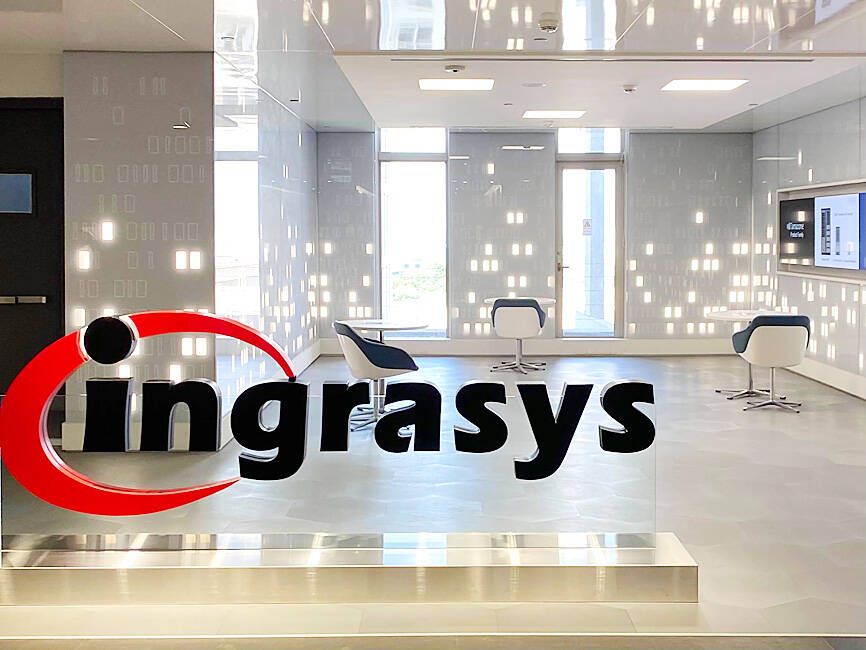Ingrasys Technology Inc (鴻佰科技), a company under the corporate umbrella of Hon Hai Technology Group (鴻海科技集團), has teamed up with Israel’s Ramon.Space to produce devices for computing in outer space.
Under the deal, Ingrasys, a server, storage and high-performance computing (HPC) accelerator development specialist, would develop and manufacture Ramon.Space’s high-volume space computing products for sale around the world, Hon Hai said in a statement on Tuesday last week.
The partnership would result in a production line for the industry’s first high-volume products for computing in space, and combine Ingrasys’ manufacturing strength and the Israeli company’s space technology capabilities, the statement said.

Photo courtesy of Ingrasys Technology Inc
Ingrasys has an AS9100 certification, the gold standard for quality and safety management in the aerospace industry, and the production line is preparing to start manufacturing the outer space computing devices, hon Hai said.
Ramon.Space’s radiation-hardened computing platform has low power requirements and durable design, which provides process, storage and connectivity capabilities, said Hon Hai, known globally as Foxconn Technology Group (富士康科技集團).
It can design devices equipped with artificial intelligence and machine-learning capabilities, paving the way to produce space computing products, Hon Hai said.
“As the trusted leader in computing infrastructure in the terrestrial world, venturing into space computing infrastructure would be another area for us to expand as we continue to see the tremendous potential in space,” Ingrasys CEO Benjamin Ting (丁肇邦) said in the statement.
“We are excited to collaborate with Ramon.Space, the market leader, to pioneer the next phase of the space industry and make space computing accessible to everyone,” Ting said.
Ingrasys’ direct parent, Foxconn Industrial Internet Co (FII, 富士康工業互聯網), a Shanghai-listed provider of intelligent manufacturing integration solutions, has entered the space computing business and is in talks with two potential clients, an industry source said.
The source said that FII has a space-computing research and development team of 300 staffers based in Taiwan, and is scheduled to launch spacecomputing servers in 18 to 24 months to meet growing demand for micro-data centers for use in outer space.

DIVIDED VIEWS: Although the Fed agreed on holding rates steady, some officials see no rate cuts for this year, while 10 policymakers foresee two or more cuts There are a lot of unknowns about the outlook for the economy and interest rates, but US Federal Reserve Chair Jerome Powell signaled at least one thing seems certain: Higher prices are coming. Fed policymakers voted unanimously to hold interest rates steady at a range of 4.25 percent to 4.50 percent for a fourth straight meeting on Wednesday, as they await clarity on whether tariffs would leave a one-time or more lasting mark on inflation. Powell said it is still unclear how much of the bill would fall on the shoulders of consumers, but he expects to learn more about tariffs

Meta Platforms Inc offered US$100 million bonuses to OpenAI employees in an unsuccessful bid to poach the ChatGPT maker’s talent and strengthen its own generative artificial intelligence (AI) teams, OpenAI CEO Sam Altman has said. Facebook’s parent company — a competitor of OpenAI — also offered “giant” annual salaries exceeding US$100 million to OpenAI staffers, Altman said in an interview on the Uncapped with Jack Altman podcast released on Tuesday. “It is crazy,” Sam Altman told his brother Jack in the interview. “I’m really happy that at least so far none of our best people have decided to take them

PLANS: MSI is also planning to upgrade its service center in the Netherlands Micro-Star International Co (MSI, 微星) yesterday said it plans to set up a server assembly line at its Poland service center this year at the earliest. The computer and peripherals manufacturer expects that the new server assembly line would shorten transportation times in shipments to European countries, a company spokesperson told the Taipei Times by telephone. MSI manufactures motherboards, graphics cards, notebook computers, servers, optical storage devices and communication devices. The company operates plants in Taiwan and China, and runs a global network of service centers. The company is also considering upgrading its service center in the Netherlands into a

NOT JUSTIFIED: The bank’s governor said there would only be a rate cut if inflation falls below 1.5% and economic conditions deteriorate, which have not been detected The central bank yesterday kept its key interest rates unchanged for a fifth consecutive quarter, aligning with market expectations, while slightly lowering its inflation outlook amid signs of cooling price pressures. The move came after the US Federal Reserve held rates steady overnight, despite pressure from US President Donald Trump to cut borrowing costs. Central bank board members unanimously voted to maintain the discount rate at 2 percent, the secured loan rate at 2.375 percent and the overnight lending rate at 4.25 percent. “We consider the policy decision appropriate, although it suggests tightening leaning after factoring in slackening inflation and stable GDP growth,”